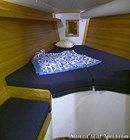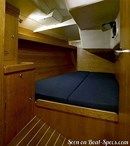J/133
Sailboat specifications
The J/133 is a 43’ (13.11m) cruiser-racer sailboat designed by Rod Johnstone (United States). She was built since 2004 (and now discontinued) by J/Boats (United States). She has been awarded "2004 - Cruising World - Boat of the Year: Performance Cruising Boat".
J/133's main features
- Model
- J/133
- Hull type
- Monohull
- Category
- Offshore cruiser-racer sailboat
- Sailboat builder
- Sailboat designer
- Country
- United States
- Construction
- GRP (glass reinforced polyester):
Sandwich balsa fiberglass vinylester (vacuum infusion) - First built hull
- 2004
- Last built hull
- Discontinued
- Award(s)
- 2004: Cruising World - Boat of the Year: Performance Cruising Boat
- Appendages
- Keel : L-shaped keel (with bulb)
- Helm
- Single helm wheel
- Rudder
- Single spade rudder
- Unsinkable
- No
- Trailerable
- No
- EC design categoryiThe CE design category indicates the ability to cope with certain weather conditions (the sailboat is designed for these conditions)
A: Wind < force 9, Waves < 10m
B: Wind < force 8, Waves < 8m
C: Wind < force 6, Waves < 4m
D: Wind < force 4, Waves < 0,5m - A
- Standard public price ex. VAT (indicative only)
- N/A €
J/133's main dimensions
- Hull length
- 43’13.11 m
- Waterline length
- 37’ 10”11.52 m
- Beam (width)
- 12’ 10”3.9 m
- Draft
- 7’ 6”2.28 m
- Light displacement (MLC)
- 17857 lb8100 kg
- Ballast weight
- 7275 lb3300 kg
- Ballast type
- Lead
J/133's rig and sails
- Upwind sail area
- 1246 ft²115.8 m²
- Downwind sail area
- 2025 ft²188.1 m²
- Mainsail area
- 582 ft²54.1 m²
- Genoa area
- 664 ft²61.7 m²
- Asymmetric spinnaker area
- 1442 ft²134 m²
- IiFore triangle height (from mast foot to fore stay top attachment)
- 57’17.37 m
- JiFore triangle base (from mast foot to bottom of forestay)
- 17’ 4”5.26 m
- PiMainsail hoist measurement (from tack to head)
- 54’16.46 m
- EiMainsail foot measurement (from tack to clew)
- 18’ 7”5.67 m
- Rigging type
- Sloop Marconi fractional
- Mast configuration
- Keel stepped mast
- Rotating spars
- No
- Number of levels of spreaders
- 2
- Spreaders angle
- Swept-back
- Spars construction
- Carbon fiber mast and aluminum boom
- Standing rigging
- Single-strand (ROD)
J/133's performances
- Upwind sail area to displacementiThe ratio sail area to displacement is obtained by dividing the sail area by the boat's displaced volume to the power two-thirds.
The ratio sail area to displacement can be used to compare the relative sail plan of different sailboats no matter what their size.
Upwind: under 18 the ratio indicates a cruise oriented sailboat with limited performances especially in light wind, while over 25 it indicates a fast sailboat. - 309 ft²/T28.71 m²/T
- Downwind sail area to displacementiThe ratio sail area to displacement is obtained by dividing the sail area by the boat's displaced volume to the power two-thirds.
The ratio sail area to displacement can be used to compare the relative sail plan of different sailboats no matter what their size. - 502 ft²/T46.64 m²/T
- Displacement-length ratio (DLR)iThe Displacement Length Ratio (DLR) is a figure that points out the boat's weight compared to its waterline length. The DLR is obtained by dividing the boat's displacement in tons by the cube of one one-hundredth of the waterline length (in feet).
The DLR can be used to compare the relative mass of different sailboats no matter what their length:
a DLR less than 180 is indicative of a really light sailboat (race boat made for planning), while a DLR greater than 300 is indicative of a heavy cruising sailboat. - 150
- Ballast ratioiThe Ballast ratio is an indicator of stability; it is obtained by dividing the boat's displacement by the mass of the ballast. Since the stability depends also of the hull shapes and the position of the center of gravity, only the boats with similar ballast arrangements and hull shapes should be compared.
The higher the ballast ratio is, the greater is the stability. - 41 %
- Critical hull speediAs a ship moves in the water, it creates standing waves that oppose its movement. This effect increases dramatically the resistance when the boat reaches a speed-length ratio (speed-length ratio is the ratio between the speed in knots and the square root of the waterline length in feet) of about 1.2 (corresponding to a Froude Number of 0.35) . This very sharp rise in resistance, between speed-length ratio of 1.2 to 1.5, is insurmountable for heavy sailboats and so becomes an apparent barrier. This leads to the concept of "hull speed".
The hull speed is obtained by multiplying the square root of the waterline length (in feet) by 1.34. - 8.24 knots
J/133's auxiliary engine
- Engine(s)
- 1 inboard engine
- Engine(s) power
- 56 HP
- Fuel type
- Diesel
- Fuel tank capacity
- 44.9 gal170 liters
J/133's accommodations and layout
- Cockpit
- Closed aft cockpit
- Cabin(s) (min./max.)
- 2 / 3
- Berth(s) (min./max.)
- 4 / 8
- Head(s) (min./max.)
- 1 / 2
- Freshwater tank capacity
- 63.4 gal240 liters
- Fridge/ice-box capacity
- 47.6 gal180 liters
- Boiler capacity
- 5.8 gal22 liters















J/Boats J/133 interior and accommodations - - 14/17
Picture extracted from the commercial documentation © J/Boats
Picture extracted from the commercial documentation © J/Boats


J/Boats J/133 interior and accommodations - - 15/17
Picture extracted from the commercial documentation © J/Boats
Picture extracted from the commercial documentation © J/Boats


J/Boats J/133 interior and accommodations - - 16/17
Picture extracted from the commercial documentation © J/Boats
Picture extracted from the commercial documentation © J/Boats


J/Boats J/133 interior and accommodations - - 17/17
Picture extracted from the commercial documentation © J/Boats
Picture extracted from the commercial documentation © J/Boats
Similar sailboats that may interest you:
Sailboats
First built hull
Hull length
1989
41’12.5 m
2006
42’ 6”12.95 m
2004
43’ 10”13.35 m
1993
44’ 4”13.5 m
2004
44’ 6”13.55 m
2010
44’ 7”13.6 m
1988
52’ 6”16 m
2003
42’ 5”12.93 m
1994
42’ 10”13.04 m
2017
40’12.2 m
2017
50’ 11”15.51 m
2003
46’14.01 m
2018
43’ 4”13.2 m
2008
43’ 1”13.15 m
2007
40’ 4”12.27 m